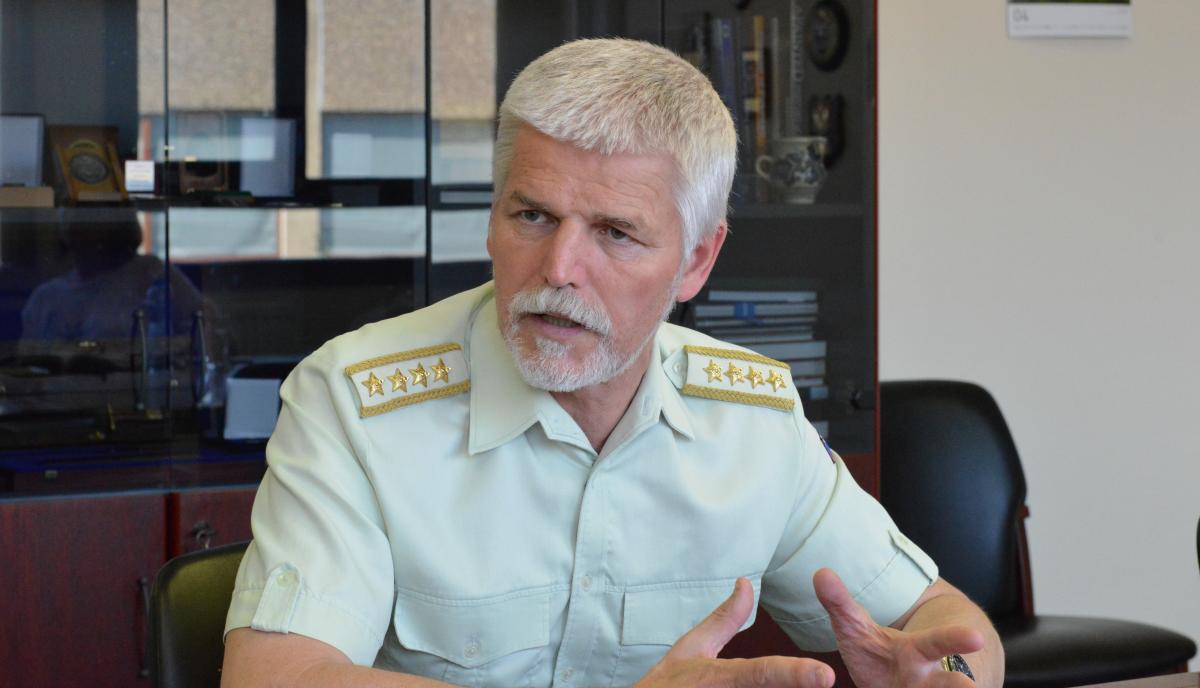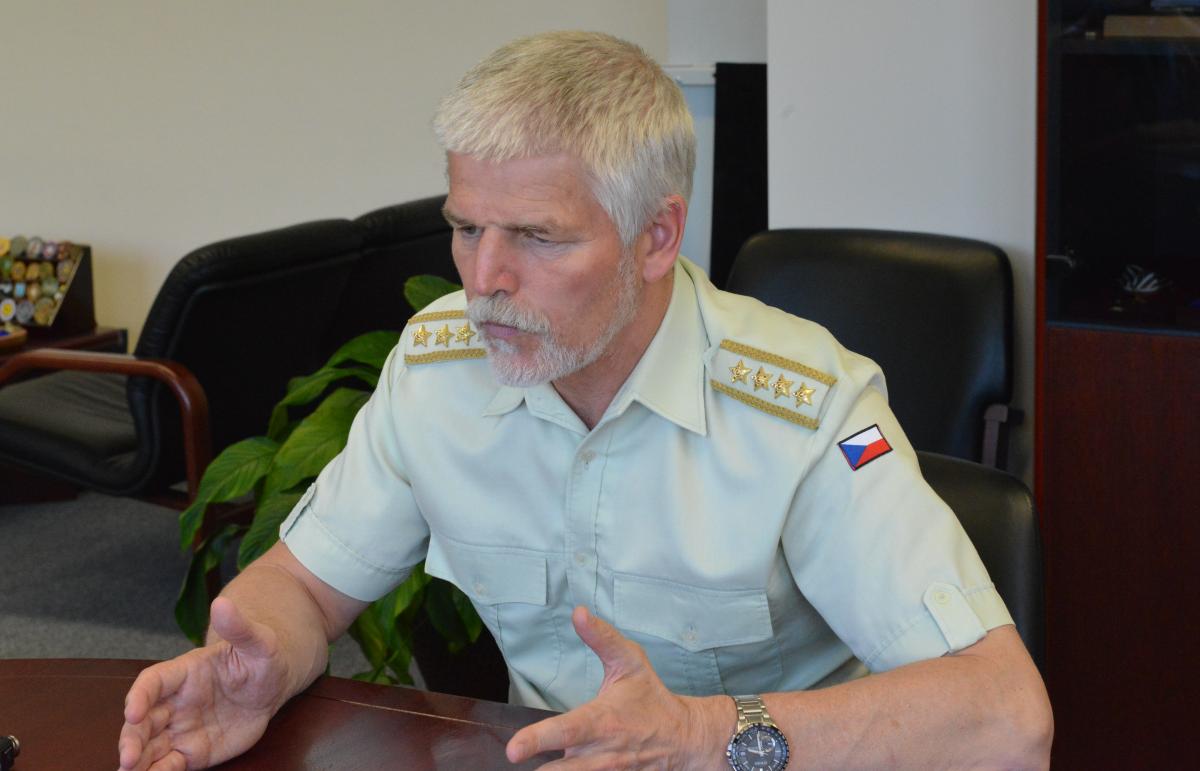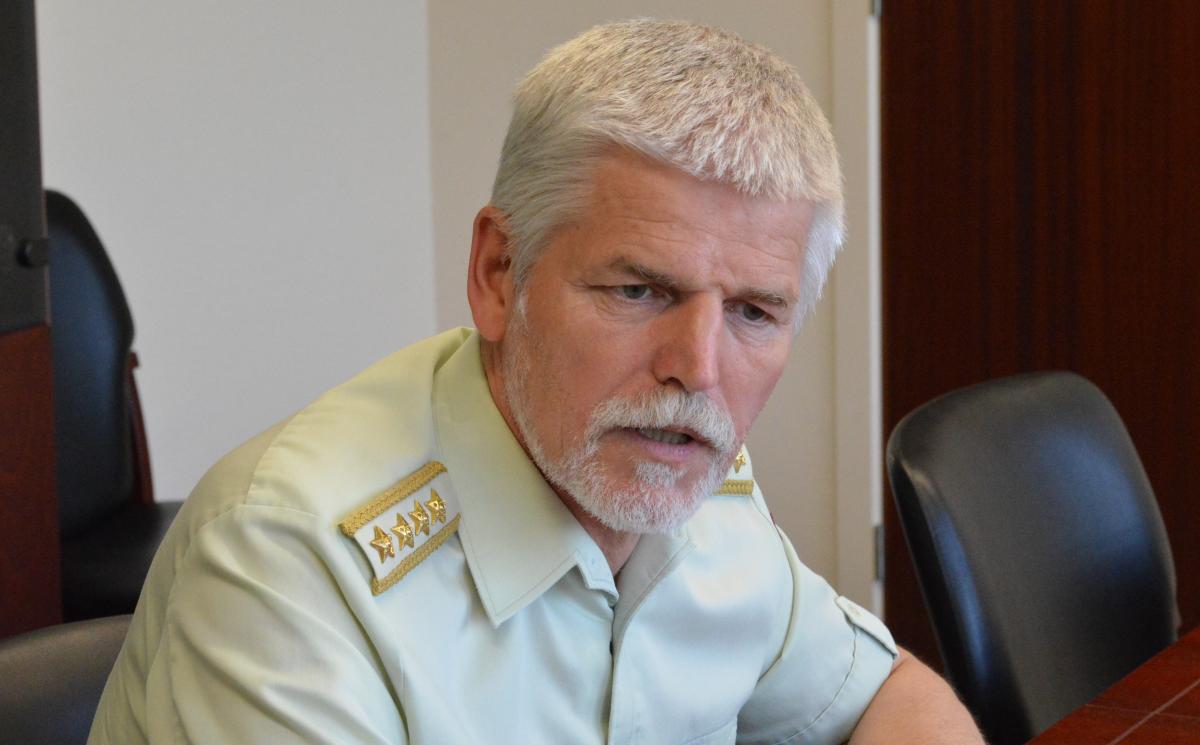
Head of NATO Military Committee General Petr Pavel: We are heading to make Ukrainian defense forces capable and credible enough to deter any potential aggression
Chairman of the NATO Military Committee General Petr Pavel sat down with UNIAN to explain whether it's possible to bring Ukrainian forces to NATO standards by 2020, be granted a Membership Action Plan, whether to expect from Russia a full-scale invasion into Ukraine in the short term, and why he believes the Donbas conflict has no military solution to it.
On April 18-19, the NATO Military Committee is visiting Ukraine. On the eve of the visit, its chief, four-star general Petr Pavel told UNIAN about the purpose of the visit, gave his assessment of the likelihood of the escalation in eastern Ukraine, and described how realistic it is for the Ukrainian army to start operating in line with NATO standards by 2020
What is the purpose of holding a Military Committee meeting in Lviv? What is on the agenda?
The Military Committee usually sits at a working level of military representatives who are representing their chiefs of defense here in Brussels, normally twice a week. But occasionally, Military Committee goes somewhere to visit the countries – either Allies or partners – to get a better understanding of the situation on the ground and also to promote partnership and cooperation.
This time we go again to Ukraine, and this time we do not go to Kyiv but to Lviv. We will visit the Military Academy, we will be received by the chief of defense and his team, and we'll also the next day, on Thursday, we'll visit this Partnership and Peace Operation Training Center Yavoriv and then we'll have a session of the Military Committee with Ukraine, so that's a joint format with the partners.
The agenda for the visit and for the meeting between NATO and Ukraine will be, I can now almost say, "traditional," to observe the progress of reforms to which we are providing the assistance, to discuss opportunities for improving our cooperation, adjust cooperation to meet the needs of both Alliance and Ukraine, and also to deepen understanding on both sides – on our side to understand realities of Ukrainian forces on the ground; and on the Ukrainian side – to understand better the procedures and positions that we are taking. We are always trying to use the time to fill it with a number of events so that they serve the purpose of both sides.
You said that at the meeting, you would discuss progress of reform in Ukrainian army. As we know, Ukraine declared it sought to achieve a goal by 2020 to have its army operating in line with NATO standards. Do you think this is a realistic task?
Firstly, to meet all the standards is almost impossible for any army. Because standards are living, they are developing. We are acquiring new equipment, we are adopting new technologies, new procedures, so standards are always living documents and they are developing and they are succeeding each other. So all countries are continuously adjusting to the flow of standards. We are always trying to be as close to standards as possible. There are differences also among NATO allies in the level of adoption of standards. What we aim with Ukraine is to assist Ukraine's Armed Forces to get as close to NATO standards as possible so that we can cooperate easily. We can also say that some standards are probably more important than the others because they allow for interoperability in operations.

Some standards, if not less important, can wait in time because they are dealing with life in peace, with training, manning, some services for personnel, so they're not mission-essential. We're focusing on interoperability first. We're also focusing on improving the life and service for Ukrainian military and civilian personnel working for the armed forces by creating conditions that are comparable to the militaries in NATO.
We have a number of programs with Ukraine which are under the umbrella of Annual National Plan and Comprehensive Assistance Package. And that Comprehensive Assistance Package defines a number of areas where NATO Allies and some partners are providing assistance to Ukraine. It's logistics, personnel management, medical care, training, maintenance of equipment, demining and disposal of explosive devices.
We now have 10 trust funds to support these activities financially. Last year, we had more than 200 assistance activities with Ukraine's armed forces. We delivered support through advisers, trainers. We are also advising at the institutional level, at the level of ministry, and general staff. The network of assistance is very broad and we're doing our best for Ukrainian forces to meet their aspirations, to meet all the standards by 2020.
It is also worth reminding that, unlike most NATO Allies who are achieving their objectives and meeting standards under peace conditions, Ukraine is at the same time fighting a war. This is a very difficult job. So I would be positive in terms of progress that Ukraine's armed forces are doing and I would also be positive in terms of objective – to get very close to NATO standards by 2020.
Noting today's progress, can we expect that interoperability will be achieved between Ukraine and NATO forces by 2020?
Interoperability comes through a number of ways. One of them is working together in operations, Ukraine is contributing to NATO operations even today. So by participating in NATO operations and exercises, receiving training from NATO instructors, Ukraine is increasing interoperability with NATO. I wouldn't go that far to say that in 2020, Ukraine's armed forces will be fully interoperable with NATO. But that's not the objective. The objective is to improve the level of cooperation to the extent that we are able to cooperate together in the current environment. We are not talking about the war, we are not talking about managing the crises. Working together to create conditions for a peaceful future of other region, that means Europe, is our objective.
How will the MC as a senior military authority in NATO be involved in the process of assessment of Ukraine's Membership Action Plan request? What will be your role in the process? What will be your advice to your political authorities? Do you believe Ukraine could get MAP at NATO's next meeting?
I would answer in two parts. One is that MAP is a tool that assisted aspiring nations to eventually become members. None of the nations in the past two decades was in the same situation as Ukraine. The situation for every nation is unique. For example, when my country (the Czech Republic), Poland and Hungary joined in 1999, the situation in the three countries was comparable. We were a part of a Partnership for Peace process, we started working on developing standards, increasing interoperability, and then we got MAP to somehow streamline preparations for membership.
With Ukraine, not only that we have much broader cooperation today than these three countries had in their period of closing to joining, MAP is a more or less political tool to express the level of aspirations and somehow define the period that remains between "today" and potential membership.
You say that MAP defines the level of aspiration for a country willing to become a NATO member, but what about the Alliance's readiness to accept this country? Isn't it a two-way street?
That's why I said it's more of a political than a military tool. For military, I can hardly imagine that granting the MAP would significantly change the level of cooperation we have between NATO and Ukraine. In fact, for us, there will be, if any, very little change. As I said, the level and depth of cooperation is already significant now and we could hardly add anything more. So any discussion on granting MAP is reserved to a political level. I can hardly comment because I would then interfere in the domain which is not mine.
So, MC will not participate in the discussion and will not provide any advice on the issue, is that correct?
No. If we, as military, are asked to provide advice, then it will be at the level of cooperation, at the level of readiness of Ukrainian forces. We can deliver it even now. We can deliver a report on the status of readiness of Ukrainian forces at any time, of course. Because we know where we are, we know where the problems and challenges are. But it's not a criterion for granting MAP. It's only a possibility that we may be asked or not at a political level for a military assessment. Because it's not a precondition. That's why I'm saying that granting MAP is a political decision, it's not based on military recommendations.
Once you've already mentioned this, I can't but ask: how ready is Ukrainian army for MAP?
There are no written military criteria for granting MAP. We assess that in general granting MAP should be an act made after a country reaches some level of reforms. And whenever I participate in a NATO-Ukraine Commission, sitting through the meetings, we all hear around the table that there is still way to go in terms of reforms. I believe that once there is a general agreement that the level of progress has reached the level that will be acceptable to ground MAP, there will be a consensus on the issue.

But that's not a military responsibility to say, OK, we have 10 different parameters, and Ukraine reached sufficient levels within all parameters, and we will now automatically pass recommendations to a political level to ground MAP. It doesn't work like that. We may be asked for some military assessment. But since we delivered such assessment for every NATO-Ukraine Commission (NUC) meeting, there is no need for specific assessment. This time, once we come back from Lviv, I will write a report from the MC to NUC. So whatever we'll hear from our Ukrainian partners, we will assess, put down into the report, and it will be forwarded to a political level. The political level is continuously informed about the level of reforms, they don't need to task us with developing a specific assessment.
Ukraine's Defense Minister Stepan Poltorak recently said that there is a possibility of the Donbas conflict growing into a full-scale Russian aggression against Ukraine. What are your observations? Do you agree with such an assessment?
We heard this argument in the past, however, the recent assessment delivered by Ukrainian authorities – both political and military – says there will not be an imminent threat of a full-scale Russian aggression. And our assessment is that such an option will be highly unlikely. There is even a question, what Russia would gain under such an aggression. We have to be realistic. On the one hand, Russia is not supportive of political settlement of the conflict. To some extent, we could also argue it is a convenient political tool to have these frozen conflicts in Georgia, Transnistria and Donbas to create political pressure on NATO and individual countries. But at the same time, Russia is not ready at this point to get engaged into a full-scale conflict of a large magnitude. So our assessment is that while Russia will not be helpful in peace process, the risk of full-scale aggression is low. That doesn't mean that we shouldn’t pay attention to the situation and that we should be complacent, not at all. We should make all efforts to exert enough pressure on Russia, to come back to respect of international law and norms and come back to, let's say, standard norms of behavior among the countries, based on rules and order which existed in the international arena. In that sense, we will also be supporting Ukraine in developing capabilities to clearly deter any such an aggression. And this is where we are heading – to make Ukrainian defense forces capable and credible enough to deter any potential aggression.
Is there a military solution to the Donbas situation? Do you see NATO's possible role in a general settlement of this crisis, or maybe also that in Syria?
It may sound strange from a military officer but I don't believe in military solution of problems of that kind. There is clearly only a political solution that can be supported by some military tools but only in terms of deterrence, not their actual use to resolve the situation. Because use of military tools will necessarily bring more suffering to people living in Donbas and in the neighboring regions. So the only solution is through political settlement, and for that political settlement there have to be a minimum of two sides – Russia and Ukraine. All others can support the process.
So NATO is supporting the process by improving capabilities of Ukrainian armed forces to create sufficient and credible deterrence against any further Russian aggression, and at the same time to create a situation where Russia would see Ukrainian forces strong enough to defend the country if necessary by all means, and also to prevent any further escalation of conflict in Donbas.
And the only solution is through a negotiating table and through implementation of Minsk agreements. Potentially, improving the Minsk Agreement by adding a clear sequence of events, clear responsibility and timelines would create conditions of accountability for all the sides to meet all the goals one by one and finally get to a normalization of the situation in Donbas.
Iryna Somer, Brussels

